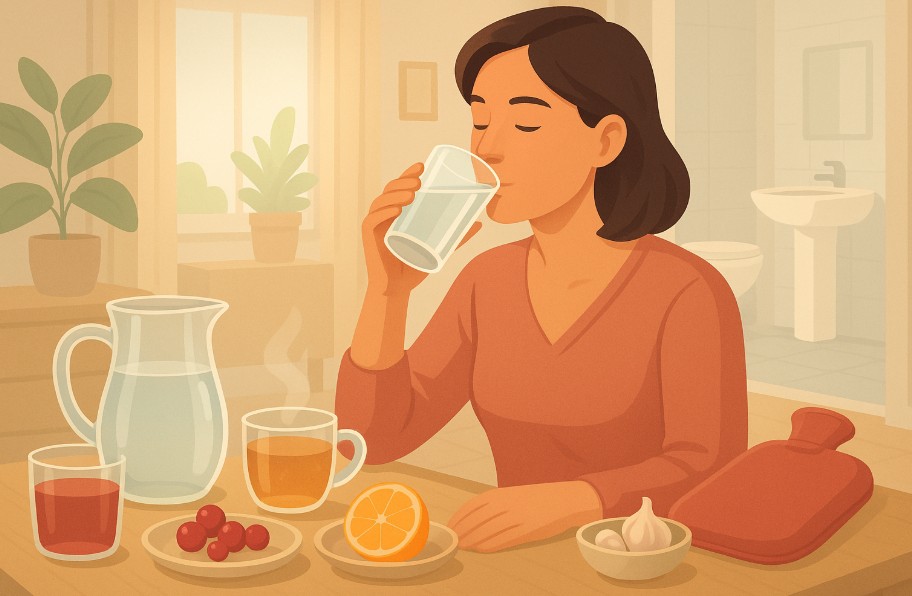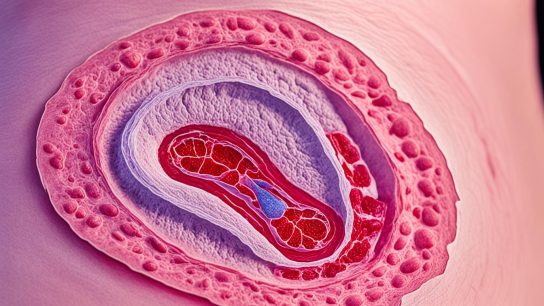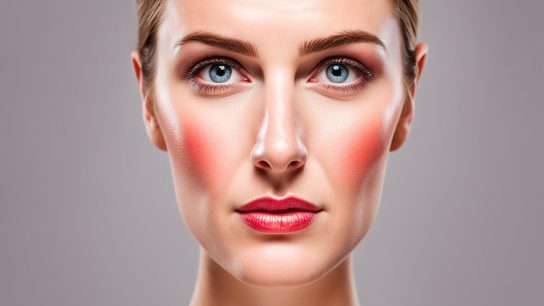Cystitis can come on suddenly and disrupt your daily life with discomfort, urgency, and painful urination. While it’s a common issue, especially among women, knowing how to get rid of cystitis fast is essential for quick relief and preventing further complications.
Cystitis is usually caused by bacterial infections, most often E. coli, and it inflames the bladder lining. Acting quickly with the right remedies can help ease symptoms and restore comfort.
This article guides you through effective home treatments, over-the-counter options, preventive strategies, and when to seek medical advice.
Whether you’re dealing with your first bout or facing recurring episodes, the solutions covered here are based on trusted medical insights. Read on to find out what really works.
What Is Cystitis?
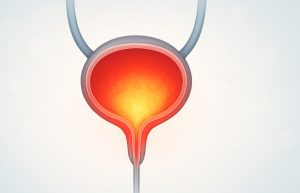
Cystitis is a type of urinary tract infection (UTI) that specifically affects the bladder. It happens when bacteria enter the urinary system through the urethra, travel to the bladder, and cause inflammation of the bladder lining.
This leads to pain, pressure, and frequent urges to urinate. Cystitis is far more common in women due to their shorter urethra, which gives bacteria easier access to the bladder.
Is Cystitis the Same as a Urinary Tract Infection?
Cystitis is a form of UTI, but not all UTIs are cystitis. A UTI can affect any part of the urinary tract, including the kidneys, ureters, bladder, or urethra. When only the bladder is affected, it’s called cystitis. Symptoms like burning urination, frequent urges, and lower abdominal pain are shared across UTIs, but cystitis does not usually involve fever or back pain unless it spreads to the kidneys.
- Cystitis is bladder-specific inflammation
- UTIs can affect the entire urinary tract
- Cystitis is usually less severe than kidney infections
While cystitis is not considered dangerous in most cases, untreated infections can spread to the kidneys and become serious. It’s important to treat cystitis promptly to prevent complications.
Why Does Cystitis Occur So Suddenly?
Cystitis can feel like it strikes out of nowhere. One day you’re fine, and the next, you’re making frequent, painful trips to the bathroom. This sudden onset is often due to a rapid overgrowth of bacteria like E. coli that thrive in the urinary tract under the right conditions.
What Causes Cystitis to Flare Up Quickly?
Several triggers can lead to a sudden flare-up of cystitis:
- Bacterial transfer from the rectum to the urethra
- Holding urine for too long
- Sexual activity introducing bacteria
- Hormonal changes during menstruation or menopause
- Use of scented products around the genitals
- Wearing tight or non-breathable underwear
These triggers allow bacteria to multiply quickly, overwhelming your natural defenses. For many, symptoms begin with a faint prickling or discomfort while urinating and escalate within hours. Staying hydrated and urinating frequently can help flush out bacteria early, potentially preventing a full-blown infection.
To avoid these flare-ups, it’s crucial to maintain proper hygiene, respond to bodily cues promptly, and be aware of high-risk behaviors.
How Can You Tell If You Have Cystitis?
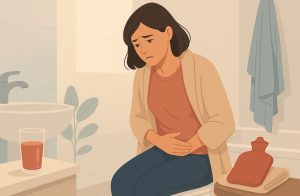
Knowing the signs of cystitis early helps you act fast and start treatment before the condition worsens. Cystitis symptoms can range from mild discomfort to intense pain, and they vary between individuals and genders.
What Are the Early Signs and Symptoms of Cystitis in Women and Men?
In both men and women, cystitis often presents with:
- A strong, sudden urge to urinate
- A burning or stinging feeling when urinating
- Passing small amounts of urine frequently
- Cloudy or strong-smelling urine
- Lower abdominal pressure or discomfort
- Mild fever in some cases
Women may also experience pelvic discomfort, while men could feel pressure around the anus or urethra. Children and elderly people may show non-specific symptoms such as tiredness or irritability.
When Should You See a Doctor for Bladder Pain?
Seek medical attention if:
- Symptoms last more than two days
- There’s visible blood in urine
- You have a fever or back pain
- You’re pregnant or have recurring UTIs
- The symptoms are severe and worsening
Catching these signs early helps in starting the right treatment, whether it’s self-care or antibiotics.
What Are the Best Home Remedies to Get Rid of Cystitis Fast?
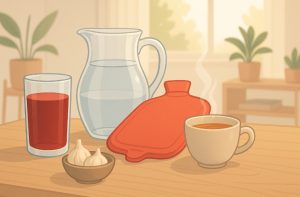
You don’t always need antibiotics to treat mild cases of cystitis. Several effective home remedies can help ease symptoms and support recovery if used early. These remedies work by flushing out bacteria and reducing bladder inflammation.
Can Drinking More Water Really Help With Cystitis Relief?
Absolutely. Water dilutes urine, flushes out bacteria, and reduces the burning sensation during urination. Aim for at least 8 glasses of water daily when symptoms arise.
- Drink 2 to 3 liters of water daily
- Avoid sugary or caffeinated drinks
- Increase fluid intake at the first sign of discomfort
Are There Natural Remedies for Cystitis That Work Quickly?
Yes, several natural solutions may offer quick relief:
- Cranberry juice (unsweetened) helps prevent bacteria from sticking to bladder walls
- Vitamin C supports immune function and acidifies urine
- Probiotics, especially those with lactobacillus, promote a healthy balance of bacteria
- Herbal teas like chamomile or parsley may soothe irritation
What Foods and Drinks Should You Avoid During a Flare-up?
During a cystitis flare-up, steer clear of:
- Caffeinated drinks
- Alcohol
- Spicy foods
- Acidic fruits like oranges and tomatoes
- Artificial sweeteners
Sticking to a bland diet and hydrating well gives your bladder a better chance to heal.
Which Over-the-counter Options Work for Cystitis Relief?
Over-the-counter (OTC) treatments can provide quick symptom relief while your body fights the infection. These are useful for mild or early-stage cystitis.
Do Anti-inflammatory Drugs Help Relieve Cystitis Pain?
Yes. Nonsteroidal anti-inflammatory drugs (NSAIDs) like ibuprofen can ease:
- Bladder pain
- Abdominal pressure
- Inflammation of the bladder lining
These medications also help manage fever, which may accompany severe infections.
Are Otc Cystitis Relief Sachets and Products Effective?
Urinary alkalizers, available in sachet form, neutralize the acidity of urine and reduce the stinging pain.
Products often contain:
- Sodium citrate or potassium citrate
- Bicarbonate of soda for home use
- Pain relievers for temporary relief
These should be used as directed and not as a long-term solution. If symptoms persist, consult a healthcare provider.
How Can You Prevent Cystitis From Coming Back?
Preventing cystitis recurrence requires daily care and attention to lifestyle habits. Understanding your risk factors and making proactive changes can significantly reduce repeat infections.
What Lifestyle Changes Reduce the Risk of Recurrent Bladder Infections?
Small adjustments in daily habits can help, such as:
- Urinating after intercourse
- Wiping from front to back
- Avoiding bubble baths or scented hygiene products
- Wearing breathable cotton underwear
- Not delaying urination when you feel the urge
These changes minimize the chances of bacteria entering and thriving in your bladder.
Can Diet and Hydration Help Prevent Cystitis Naturally?
Absolutely. Staying hydrated is key.
Also:
- Drink water throughout the day
- Limit intake of bladder irritants (caffeine, alcohol)
- Include probiotic-rich foods like yogurt or kefir
- Eat anti-inflammatory foods like leafy greens and berries
These dietary habits support urinary tract health and reduce bacterial growth.
When Is Medical Treatment Needed for Cystitis?
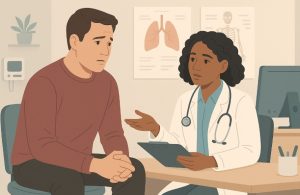
Sometimes, self-care isn’t enough. Knowing when to get medical help ensures timely recovery and avoids serious complications.
What Treatments Do Doctors Recommend for Persistent or Chronic Cystitis?
Doctors may prescribe:
- A short course of antibiotics for uncomplicated cases
- Longer or repeated courses for chronic cystitis
- Urine tests to identify the exact bacteria
- Imaging tests if structural issues are suspected
Regular episodes might indicate underlying conditions like kidney stones or hormonal changes, requiring further investigation.
Are Antibiotics Always Necessary for Cystitis?
Not always. Mild cases can clear up with home care and OTC treatments.
However, antibiotics are crucial when:
- Symptoms persist beyond 2–3 days
- There’s visible blood in the urine
- You experience fever or kidney pain
Never self-prescribe antibiotics, as misuse can lead to resistance and worsening infections.
What’s the Fastest Way to Soothe Bladder Pain at Home?
Pain from cystitis can be intense and draining. Fortunately, there are fast-acting home methods to ease the discomfort while treatment takes effect.
How Can You Calm an Irritated Bladder Without Medication?
Non-medicinal methods include:
- Drinking warm, soothing fluids
- Resting and minimizing movement
- Using natural anti-inflammatory teas like chamomile or marshmallow root
- Avoiding bladder irritants in your diet
These practices help relax the bladder muscles and reduce spasms.
Do Heat Pads or Herbal Teas Provide Quick Relief?
Yes, they can be very effective:
- A warm heating pad placed on the lower abdomen can ease cramping
- Herbal teas like corn silk or parsley may have mild diuretic effects
- Sitting in a warm bath can also reduce pressure and relax pelvic muscles
Used together, these methods offer fast and natural symptom relief.
Can Chronic Cystitis Be Managed Naturally?
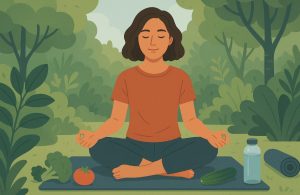
Chronic cystitis needs consistent attention, but natural strategies can significantly reduce flare-ups and improve quality of life.
What Long-term Remedies Help With Recurring Cystitis?
To manage chronic cystitis naturally:
- Incorporate probiotics daily
- Stay hydrated consistently
- Avoid known personal triggers like stress or specific foods
- Monitor and maintain vaginal and urinary health through regular hygiene
Some may also benefit from bladder training or physical therapy under medical guidance.
Is There a Holistic Approach to Managing Bladder Health?
Yes, holistic care focuses on treating the whole system. It includes:
- A balanced diet rich in anti-inflammatory foods
- Stress management techniques like yoga or meditation
- Herbal supplements after medical consultation
- Gentle exercise to improve blood flow to the pelvic region
Natural management works best when combined with professional medical advice.
Conclusion
To get rid of cystitis fast, early action is your best ally. Begin with proper hydration and avoid irritants. Use OTC pain relief or alkalizers if needed, and watch for signs that indicate medical attention is necessary.
Prevention plays a critical role Practicing hygiene, drinking water regularly, and eating bladder-friendly foods can help stop future infections. Whether you choose natural remedies or medical support, consistency in care ensures your bladder stays healthy.
FAQs
How long does it take for cystitis to clear up naturally?
Mild cases may improve within 1 to 3 days with home care, especially if caught early.
Can you treat cystitis without antibiotics?
Yes, with hydration, OTC products, and hygiene measures, but antibiotics are needed if symptoms worsen.
What drink is best for flushing out a bladder infection?
Water is best, but herbal teas like chamomile and cranberry juice may also support healing.
Is cranberry juice really effective for cystitis?
It may help prevent bacteria from attaching to the bladder lining, but its effectiveness varies by person.
Can cystitis go away on its own without treatment?
Sometimes it can, especially if caught early, but medical attention is needed if symptoms persist.
Are there any supplements that help with bladder infections?
Probiotics and vitamin C may help support urinary tract health and prevent infections.
How can I stop cystitis from coming back again?
Practice good hygiene, drink plenty of water, urinate after sex, and avoid bladder irritants.

